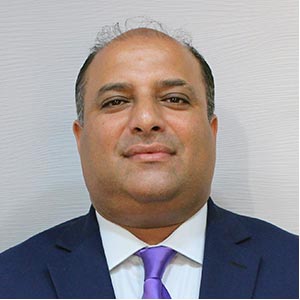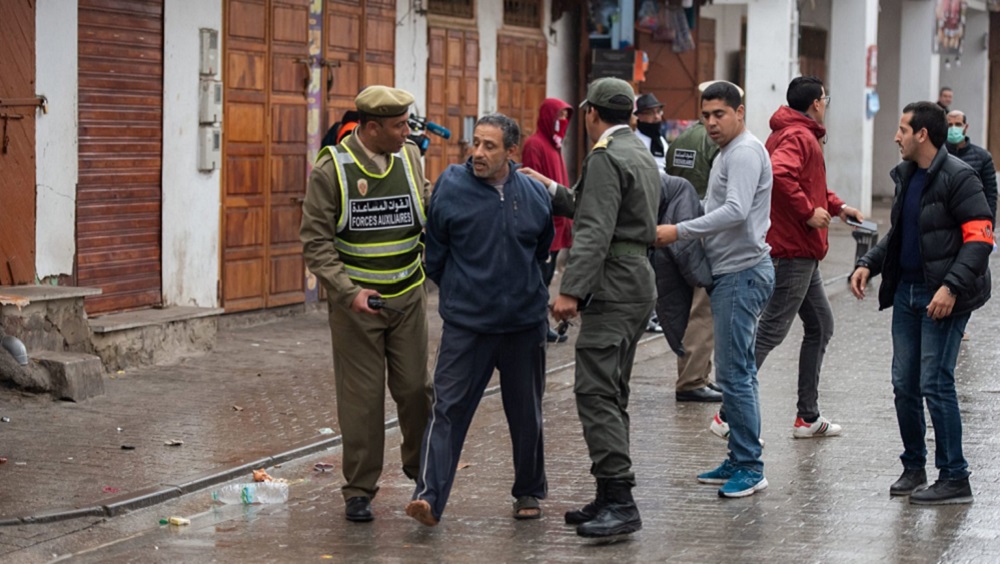
Morocco reacted decisively to the threat of Covid-19 pandemic, declared a state of emergency, and imposed a strict one-month curfew on 20 March and extended it until 20 May 2020. The Moroccan authorities implemented several measures to control the spread of the virus, while the monarchy launched an image repair campaign to solidify popular trust of the Palace. Still, the number of infections escalated to 7023, and the death toll reached 193, while 3901 recovered by May 20. There is also some popular skepticism about the country’s public health infrastructure. About 70 percent of the hospitals in the country are considered decadent. A recent study published by the Moroccan Institute for Policy Analysis (MIPA), indicated 74 percent of the respondents “distrust the hospitals” capacity to cope with this new security challenge but are satisfied with the measures implemented. Prime Minister Saad Dine El Otmani announced Morocco would to extend its national lockdown until June 10.
However, 58 percent of Moroccans were not confident in the government’s capacity to manage the pandemic.(1) The political institutions, notably the parliament and the Council of Ministers, are not in a better position in the eyes of ordinary Moroccans. The level of satisfaction with the government’s performance remains extremely low. Only 23% have confidence in their government; 69% of Moroccans said they did not trust all political parties; and only 25% trust unions or syndicates, according to a recent poll conducted by MIPA in December 2019.(2) This paper examines Morocco’s socio-economic and political challenges during the Coronavirus crisis and beyond amidst popular discontent. The economic outlook looks grim as 57 percent of companies in the country have temporarily or permanently suspended their activities. A post-Coronavirus reality will test the wisdom of the assertive security measures in addressing the multi-layered challenges of the pandemic. It also probes into whether the popular pulse can pave the way toward a democratic transition.
Introduction
In March, Morocco’s strategy of containing the spread of Coronavirus was praised by certain European political figures and media outlets. During his statement before the National Assembly in Paris, French leftist politician Jean Luc Melenchon considered Morocco’s response as inspirational; and said “Morocco has performed well in its plan to combat Covid-19 by commandeering its textile industry to make protective masks. France should be inspired by it.” In neighboring Spain, the president of the Foreign Affairs Committee in the Senate, Antonio Gutierrez Limones, described the Moroccan response as efficient and effective; “Morocco has launched the largest field hospital in Africa, which was completed in two weeks, with a capacity of more than 700 beds, while more than 83 million masks have been produced to date.”
Italian news agency NOVA also praised Morocco’s plan of dealing with the Coronavirus threat as “unprecedented and the first of its kind in Africa”. The agency highlighted several steps taken by Morocco such as the closure of borders, the health quarantine and social distancing, the compulsory wearing of protective masks, as well as the upgrading of medical equipment, the strengthening of hospital bed capacity, and the mobilization of military medical staff and infrastructure in the fight against the pandemic. According to NOVA, these measures amount to a Moroccan “Marshall Plan”.(3)
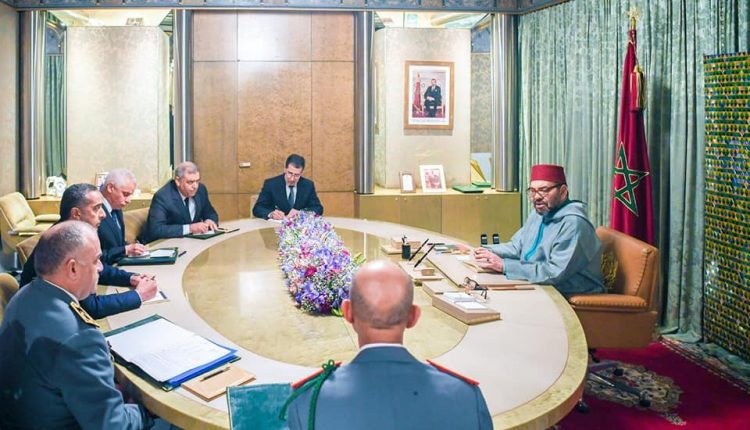
Morocco’s set of restrictions seemed extremely tough with the aim of protecting the country, ensuring national security and public health as top priorities. Accordingly, a full-fledged lockdown was enforced under intensive security measures. Tough penalties and jail sentences targeted individuals who defied the new restrictions or did not abide by the imperative of social distancing and isolation policies. The European Union spokesman Peter Stano expressed satisfaction Morocco would be able to play its full part in “the collective efforts of the continent and its institutions with a view to combating the virus.” Europe has allocated an aid package of more than €20 billion to support research, health systems, and water networks in EU partner countries to mitigate the socio-economic consequences of Coronavirus. Stano highlighted more than €3.25 billion is directly intended to support actions in Africa, with “€2.06 billion in sub-Saharan Africa and € 1.19 billion in North African countries.”(4)
The official infection rate remains comparatively low after the Moroccan authorities began closing borders, suspending all international flights, cruises, and passenger ships, and enforcing restrictions on domestic flights March 15.(5) Following the World Health Organization guidelines and the lessons learned from Italy, Morocco made tests available and free to all citizens. A special fund was created per King Mohammed VI’s instruction, bringing in $1.5 billion in donations from Moroccan corporations, banks, and even private individuals to help finance the country’s coronavirus response.(6) Members of the parliament, the government and the judiciary in Rabat also donated their salary to support the country during these difficult times. Healthcare centers prepared 1,640 beds for coronavirus patients, including 250 beds reserved for life-threatening cases. On March 22, Morocco received a delivery of necessary medical aid from China to help halt the spread of pandemic.(7)
Despite these measures, Morocco witnessed several public gatherings in violation of the official guidelines. The strict enforcement of the emergency state, and the general applause for state decisions, were defied by protests in Tangier, Sale and Fez. On the night of March 22nd, groups of protestors were shown on social media and local media demonstrating in the streets, chanting ‘God is the greatest and only he can help us’(8). The Interior Affairs Committee at the Parliament in Rabat unanimously passed a new bill to discipline violators and criminalize all actions that could jeopardize the country’s state of emergency and put the population at risk.(9) The Moroccan police has arrested at least a dozen people for reportedly ‘spreading rumors about the Coronavirus’(10). Some critics have denounced these heavy-handed measures as an oppressive policy that defeats the purpose of containing the new virus. This kind of reactions highlights the question about the validity and transparency of the security policies undertaken by the Moroccan authorities vis-à-vis the Coronavirus within dramatic expansion of the power of the state. The Moroccan case confirms some correlation between the fear of the pandemic and the surge in authoritarianism.
Encyclopedia Britannica defined authoritarianism as “principle of blind submission to authority, as opposed to individual freedom of thought and action.” A recent Foreign Policy article illustrates, “Now, as countries around the world institute extraordinary measures to fight the pandemic, both dictatorships and democracies are curtailing civil liberties on a massive scale.”(11) In his "Authoritarian Resilience" article, Andrew J. Nathan explains how “regime theory holds that authoritarian systems are inherently fragile because of weak legitimacy, overreliance on coercion, over-centralization of decision making, and the predominance of personal power over institutional norms.... Few authoritarian regimes—be they communist, fascist, corporatist, or personalist—have managed to conduct orderly, peaceful, timely, and stable successions." (12)
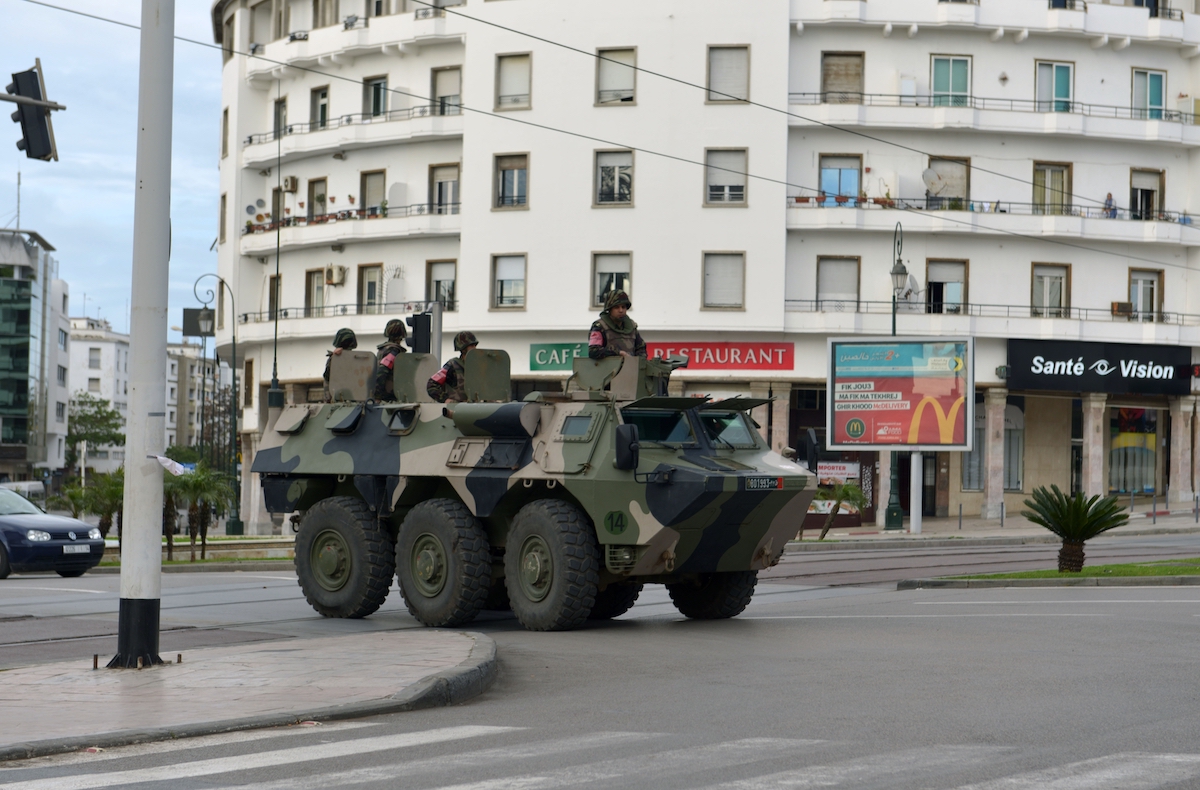
Since the 2001 Arab uprisings, Morocco’s political regime has faced several challenges in its pursuit of eclipsing the formal and unformal opposition and controlling the frequent socio-economic and political upheavals in different areas in the country. The country’s human rights record has been undermined by the authorities’ approach toward the 20 February Movement in 2011 and the Rif protests in 2017. Morocco aligns itself with countries where democratization has regressed. In 2019, 64 countries became less democratic, and only 37 became more so”, according to Freedom House. This is part of decade-long decline of democracy in the world.(13)
The Coronavirus era is a very though in socio-economic terms. The Moroccan political system seems to be benefiting from these challenging times to solidify its social contract. The legitimacy of the state was worn by weak socio-economic mobility, increasing inequality and blatant favoritism. Marginalized groups in poor areas have contested the existing social contract as ‘unfair’, being merely a deal between an autocratic government and crony businessmen who benefit from protection, access to government contracts and suppression of organized labor. The masses are excluded from reshaping the social contract, being kept in check by increasingly empty promises of social programs and (police) repression(14).
By evoking Habermas’s rather idealistic notion of the public sphere, the Moroccan civil society is elitist by nature and has had weak impact. Scholars like Denoueux and Gateau (1995) have pointed out that many Moroccan CSOs are linked more to the state than to the real concerns of society, which raises the question of whom the local civil society represents.(15) Furthermore, Morocco’s Government Council approved a controversial draft law 22-20 that seeks to regulate the social media, broadcast networks under the pretext of ‘fighting fake news’ on March 19. Article 14 of this pending legislation stipulates that anyone who calls for a boycott against a specific product or service in public or through social networks, undermining public order, should receive a prison sentence ranging between six months and three years, as well as a fine between 5,000 MAD and MAD 50,000 ($500 to $5,000)(16).Thousands of activists, including public figures, have signed a petition against a recently-adopted bill on the use of social media, broadcast networks, and similar means of communication(17).
Questioning the Security and Judiciary Measures
Two weeks after Morocco confirmed its first case of COVID-19, the government in Rabat declared a “health state of emergency”. These exceptional measures included a mandatory nationwide lockdown, a curfew enforced by visible presence of police units and armored vehicles, and a ban of movement in and between cities with the exception of officials passes issued by local authorities. Since March 20, Around 50,000 people have been arrested which led to the prosecution of more than 25,000 Moroccans for violating the state of emergency(18). The Moroccan authorities have prosecuted thousands of individuals for violating the state of emergency or for spreading false information. Yet the government has also released thousands of other offenders from its prisons to reduce the threat of clusters inside the prisons.
The Moroccan public has generally accepted these health measures. Some widely-shared videos have shown police commanders and local officials forcing people to return to their homes, sometimes aggressively. At least seventy people, including nineteen held in detention, were prosecuted for distributing the so-called ‘fake news’ or disseminating ‘hate speech’. For example, Salafi preacher Abou Naim, who contested the authorities’ decision to close mosques, was arrested on March 17 and sentenced to one year of jail for inciting hatred and undermining public order.(19)
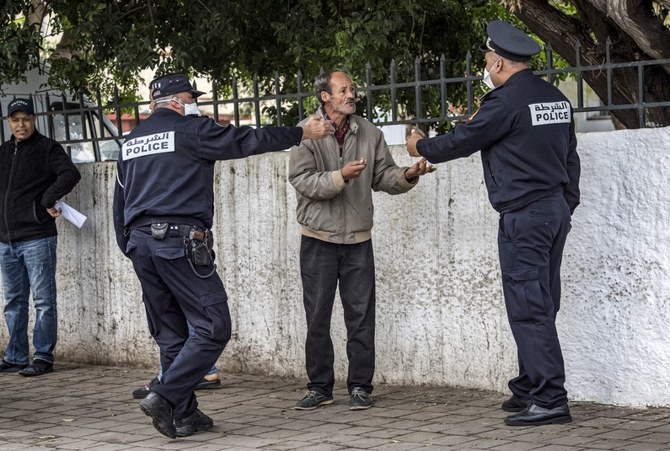
Human Rights at the Crossword
Since Morocco’s Hirak or protest movement erupted in late 2016, the Moroccan Association for the Protection of Human Rights, known by its French acronyms AMDH, has documented more than 1,000 cases of political detention throughout the country.(20) The detainees include protesters, human rights activists, trade unionists, and university students. The AMDH central bureau says hundreds have received a royal pardon, while many others have completed their sentences, leaving about one hundred currently jailed for political motives.(21)
The International law guarantees everyone the right to the highest attainable standard of health. However, restrictions on some rights can be justified when they have a legal basis, based on scientific evidence and neither arbitrary nor discriminatory in application, of limited duration, respectful of human dignity, subject to review, and proportionate to achieve the objective.(22) According to Morocco’s official narrative, the Coronavirus containment measures outlined in the decrees seem to be fully in compliance with the limitations imposed by the international law on exercising those fundamental rights. They have been adopted by law, with the legitimate aim of protecting public health from a pandemic and are both necessary and proportionate. Moroccan officials have explained that the measures, which limit social contacts, are not only adequate but have proven to be the only effective measures to limit the spread of COVID-19. Moreover, the measures imposed by the Moroccan government are strictly limited (materially and in time) to the exigencies of the situation.(23) According to local journalists, lockdowns have made it impossible for them and for civil society activists to conduct on-the-ground research and investigations.
The United Nations Human Rights Office voiced concern about more than a dozen countries that have declared states of emergency due to the COVID-19 pandemic where police have arrested or detained hundreds of thousands of people and killed others. The U.N. High Commissioner for Human Rights Michelle Bachelet has listed Morocco, among 15 countries, as a violator of human rights during the pandemic time. Bachelet also highlighted police and other security forces in those countries “are using excessive and sometimes deadly force to enforce lockdowns and curfews."(24)
The Moroccan measures have also ignited some criticism inside the coalition government. Islamist Minister for Human Rights Mustafa Ramid has argued corruption in Morocco is no less dangerous than Coronavirus in threatening the country’s security and stability. He stated “If spread in a society, corrupts its political institutions, spoils its economic climate, and affects the principle of the rule of law and the achievement of justice… It is impossible to imagine a democracy with corruption. There are elected people circumventing and receiving bribes without leaving any traces. They may enter with zero dirhams and come out with a billion dirhams because of the absence of a legal framework for illicit enrichment. Fighting corruption cannot be achieved by establishing institutions, but rather by reviewing all legislations and ridding them of rent and discrimination between citizens.”(25)
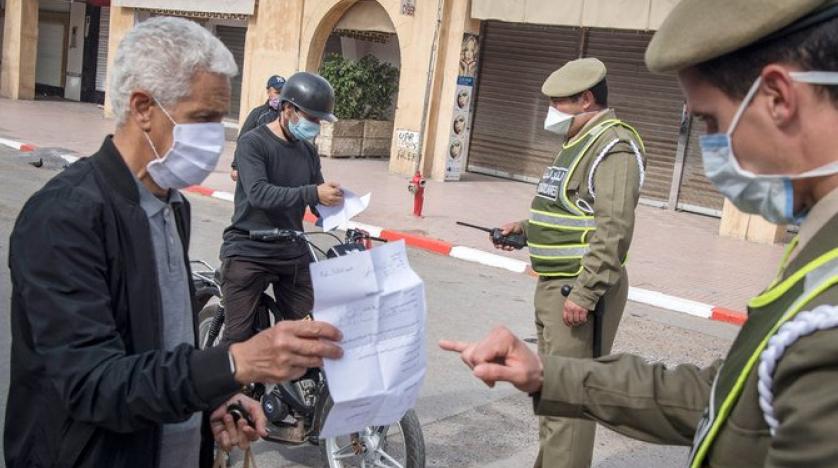
Fragilized Economy: The Dark Side of the Story
There are several reasons for concern over the Morocco economic decline under Coronavirus: the public health system is ramshackle and overstrained even at the best of times. There is also shortage of doctors, hospitals and health centers in urban and rural regions outside of the major cities of Rabat and Casablanca. The open-ended lockdown may make perfect sense from a medical perspective; however, it deprives millions of Moroccans of their livelihoods. More than 2.4 million Moroccans work permanently in the informal sector, not to mention seasonal agricultural workers. These individuals are to receive quick and simple support – with the help of modern technology. Shortly after the lockdown began, Morocco's Economic Monitoring Committee pledged to provide swift support for those in the informal sector who have lost their earnings.
With the extension of the lockdown measures until June 10, Moroccans are increasingly worrisome about the economic implications of the pandemic. There is widespread feeling of uncertainty about the impact of the pandemic of the economic ramifications(26). The Moroccan government sent a letter to the European Union March 26 predicting significant losses in tourism, automobile, and textile industries in 2020. It highlighted how the EU accounts for more than 58 percent of Moroccan exports, 59 percent of foreign direct investments (FDI), and 70 percent of Morocco’s tourism industry. While Morocco has not yet experienced the full effects of the virus on its economy, the expected decrease from European markets will soon be felt domestically.(27)
Government data indicates a total of 113,000 companies have frozen their operations since March 15. More than 900,000 employees have been laid off as a result. Another economic side effect of COVID-19 is the drastic reduction of funds from the Moroccan diaspora, which many families rely upon. Moroccan migrants abroad make a significant contribution to the national economy; around 69 percent of Moroccans residing abroad (MRE) transfer around a quarter of their annual income back home. The tourism industry is projected to be the hardest hit sector of the economy. The National Tourism Confederation (CNT) estimates the projected losses for 2020 to be approximately $34.1 billion in overall tourism revenue and $14 billion from the hotel industry alone. CNT predicts a 98 percent drop in tourists visiting the country, which will put 500,000 jobs and 8,500 businesses at risk.
The rhetoric of national solidarity or sacrifice seems to overshadow a logic of security survival in terms of no discussion of the conditions that had led to the current situation. American economist Mancur Olson (1932-1998) uses the metaphor of the “stationary bandit” to explain the function of the state. For him, the state is nothing more than a bandit whose objective is to maximize his resources by taxing the population and maximize the extraction of the population's resources in the long term.(28) The state’s goal is not to provide decent conditions for the people, but simply to maintain a minimum level of survival that would allow state’s extractive institutions to continue operating. In the past, The State did not take care of extortion of private clinics, dilapidated public hospitals, the homeless, the contempt of law enforcement officials for the most deprived people.(29)
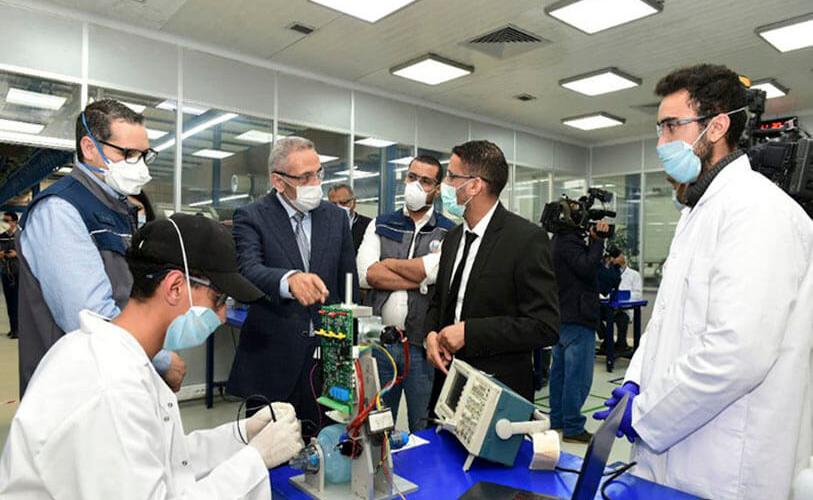
The lockdown’s unsustainability further aggravates social precarity. For dwellers of slum-like economic apartments or daily workers, for instance, home confinement, social distancing and proper hygiene are luxuries they cannot afford. If the health emergency extends, a significant amount of citizen-oriented measures will be required. The situation in prisons, for example, urged human rights activists to circulate a petition inviting the king to widen the positive impact of his steps by granting amnesty to prisoners of opinion, especially Rif Hirak activists.(30)
Authoritarianism Stages a Comeback
The Coronavirus pandemic poses tremendous challenges for governments across the globe, and this holds especially true for states in the Middle East and North Africa region, where citizens do not approve of government performance and do not trust key state institutions. The 2019 Arab Barometer survey found Moroccans do not trust most of the country’s political institutions, notably the parliament and the Council of Ministers, and the level of satisfaction with the government’s performance remains extremely low.(31) According to the Trust in Institutions Index, presented by the Moroccan Institute for Policy Analysis (MIPA), Moroccans do not trust public and political institutions. They are more likely the most mistrusted organizations in Morocco. As mentioned in the abstract, around 69 percent of Moroccans do not trust elected officials and political parties; 75 percent do not trust labor unions, 77 percent do not trust the government, and Over half of Moroccans, 59 percent, mistrust the judicial system.(32)
Moroccan authorities have launched an image repair campaign that purports to bring more trust to the Palace. The monarchy has positioned itself as the most proactive stakeholder in health security governance. It is not unusual that in times of crisis, the real chain of command more markedly unveils itself, not least to prove itself to the citizenry in comparison to other actors, especially political parties.(33) King Mohamed, the Commander in Chief of the Armed Forces, ordered the military to turn over medical facilities and staff as part of the government’s response to the pandemic. In addition, the Moroccan army has equipped medical facilities in various regions of the country to deal with the COVID-19 outbreak. With the ubiquity of security institutions and the passing of a medical emergency law, citizens and observers did not react nervously to the mostly limited visibility of the army. Under the medical emergency law, the royal army and the Ministry of Interior—known for working under the King’s auspices—proved to be empowered. At the same time, other political actors refrained from taking a leading role. They show total support for royal steps, somehow opportunistically, to shun accountability should the king’s policies fail.
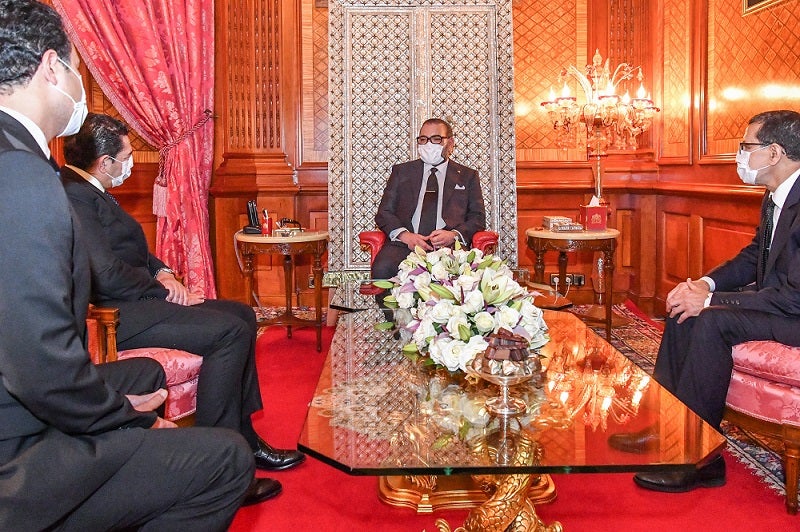
There has been a call for unity in the face of a national and global crisis. Opposition groups such as Adl wal Ihssan(34) and Rif activists(35) expressed their support for the government measures and encouraged people to follow the new guidelines. However, despite calls to release political prisoners,(36) the Moroccan authorities have not indicated that they will do so. This could be a missed opportunity vis-à-vis the opposition in mending the national unity during the crisis.(37)
Regardless of the promising signs of what could be a short-term momentum in unity and institutional trust, the institutional weaknesses in the public policy and healthcare system have not disappeared. Since the 2011 Arab uprisings, there has been growing distrust in the Moroccan political institutions. Individuals, advocacy groups, and local civil society are contesting the monopoly of Makhzen, or deep state, and the so-called ‘servants of the state’ in reproducing the traditional power relations. In its 2018 Global Democracy Index, the Economist Intelligence Unit studied 167 countries using 60 indicators across five broad categories: electoral process and pluralism, the functioning of government, political participation, democratic political culture, and civil liberties. Morocco ranks 100th out of 165 countries, with 4.99 points out of 10. It is considered one of the hybrid systems between “authoritarian regimes” and “flawed democracies.” The Economist predicts Morocco would continue to struggle with social unrest. “It is unlikely that the underlying causes of the [Rif] unrest (such as the entanglement of politics and big business and widespread inequality) will be fully addressed in the near term.”(38)
In Morocco, the new virus has exposed not only healthcare structural shortcomings and inefficiencies since 70 percent of hospitals are decadent(39), it has also revealed sharp inequalities among citizens and regions. Restrictive measures affect the fragile fringes of the population. In the emergency, more vulnerability and starvation are awaiting temporary workers, street vendors, and all those in the informal economy that accounts for more than 20 percent of the GDP.(40) Civil society can help greatly if the state paves the legal way for solidarity action 19 Dealing with this unprecedented health security threat could be a missed opportunity to forge new social contracts and further democrat. At the regional scale, fear of the COVID-19 outbreak has temporarily suspended(41) anti-government protests simmering in countries like Algeria, Iraq, or Lebanon over the last year. Though protests have been less intense recently, Morocco makes no exception.
In Morocco, the King’s initiative has ensured promptness, yet eclipsed other political actors. It has also reenergized the calls for accountability, transparency, and democratization. There is lack of a broader debate on the political actors bestowed with providing security, on what ‘security’ means during the pandemic, and for whom. With a growing pattern of securitization, some individuals and groups welcomed police brutality and violence against those who defy the quarantine rules. Few voices have questioned the implications of corruption on the inconsistencies of the health system in the country.(42)
In light of the authoritarianism theory, the specific strategic apparatuses of control deployed have the potential to produce new configurations of power and political agency, contributing to the normalization of certain security practices. The mechanisms of power at play could ensure the continuous institutionalization of state control and the regulation of society’s movement in the public space. the instrumentalization of fear and repression are likely to harm long term trajectories of civil-state relations. This is particularly important considering the pre-existing tensions over Morocco’s crackdown on activists and journalists prior to the outbreak. A serious focus on a holistic approach to health, where information is provided transparently and efficiently by the concerned authorities, would prove more effective – but this would not serve the objective of institutionalizing new forms of repression(43).
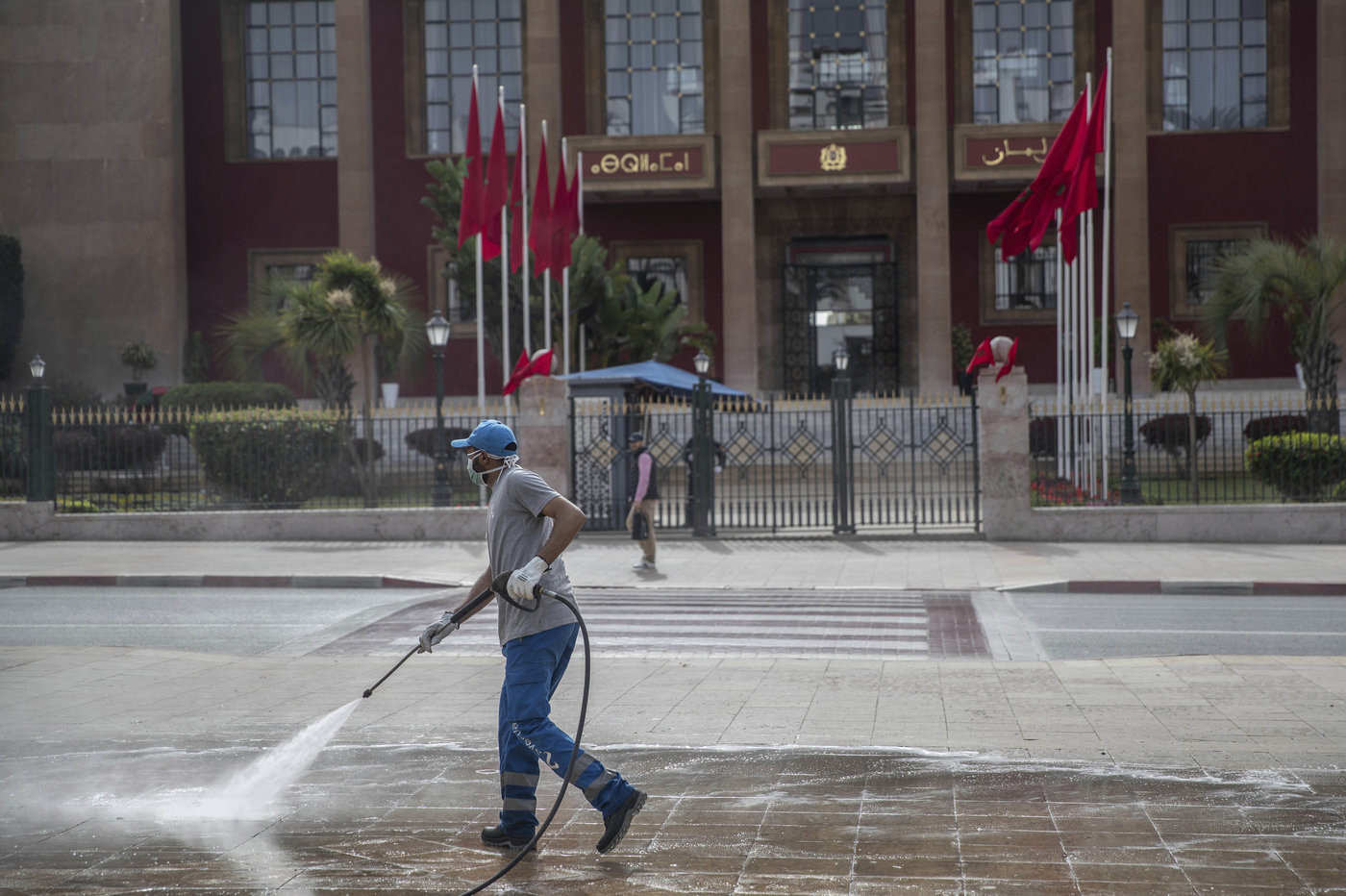
The Moroccan authorities’ pursuit of winning the hearts and the minds of their local citizens appears to be effective so far. The Coronavirus pandemic provides an avenue through which the state is not only able to control and diffuse existing political tensions; but the powerful tide of nationalism, in times of insecurity, yields the ability to reinstate a renewed and shared understanding of the nation. Yet this approach might be short-lived considering the weak healthcare infrastructure systems and the public’s low levels of trust in political institutions. Whether we see uprisings or a tighter union between the state and the people remains highly contingent upon the levels of repression deployed and, more importantly, the state’s ability to absorb the crisis.
Conclusion
Although the Coronavirus happens to be a global pandemic affecting human life across borders, nationalities, ages and colors, the impact has been greatly proportional in many ways to how prompt local decision-making in handling the pandemic and enforcing policies in place. For Morocco, the coming weeks and months are crucial as security governance tackles the multi-layered challenges of COVID-19. The outbreak will inevitably be defeated. Today, this pandemic makes an opportunity for serious and new thinking about the political priorities, to review the economic development reform within national institutions, and reconstruct a new social inquiry that enhanced coordination between local business, national enterprises and upgrades Morocco’s economic-political structure among its community.(44)
(1) Giulia Cimini and Abderrahim Chalafaout, “Coronavirus in Morocco Opens Possibilities for New Social Contracts”, Carnegie, April 23, 2020 https://carnegieendowment.org/sada/81631
(2) MIPA, Trust in Institutions Index: Preliminary Findings, December 11, 2019 https://mipa.institute/7141
(3) Madeleine Handaji, “Moulay Hicham Dissects Morocco’s COVID-19 Response in Ill-Timed Analysis”, May 8, 2020 https://www.moroccoworldnews.com/2020/05/302020/moulay-hicham-dissects-…
(4) Safaa Kasraoui, “EU Convinced of Morocco’s Crucial Role in African COVID-19 Response”, Morocco World News, April 29, 2020 https://www.moroccoworldnews.com/2020/04/301101/eu-convinced-of-morocco…
(5) Florian Bieber “Authoritarianism in the Time of the Coronavirus”, Foreign Policy, March 30, 2020 https://foreignpolicy.com/2020/03/30/authoritarianism-coronavirus-lockd…;
(6) Coronavirus and the Middle East's ongoing state of emergency, Qantara.DE 24.04.2020 https://en.qantara.de/content/politics-inequality-and-a-lack-of-transpa…
(7) Morocco to create $1 billion fund to counter coronavirus outbreak, Reuters, March 16, 2020 https://www.reuters.com/article/us-health-coronavirus-morocco/morocco-t…
(8) Safaa Kasraoui, Morocco Receives Chinese Cargo to Help Challenge COVID-19 Spread, Morocco World News, March 23, 2020. https://www.moroccoworldnews.com/2020/03/297251/morocco-receives-chines…
(9) Video: Moroccans Slam Demonstrations defying Morocco’s State of Emergency’, MoroccoWorldNews March 22nd 2020
(10) Parliament Committee Adopts Health Emergency Draft Decree Law, MAP 23 March 2020. https://www.mapnews.ma/en/actualites/politics/parliament-committee-adop…
(11) Andrew J. Nathan, "Authoritarian Resilience", Journal of Democracy, 14.1 (2003), pp. 6–17.
(12) Florian Bieber “Authoritarianism in the Time of the Coronavirus”, Foreign Policy, March 30, 2020 https://foreignpolicy.com/2020/03/30/authoritarianism-coronavirus-lockd…;
(13) Middle East Monitor, “Morocco minister of human rights: ‘Corruption is no less dangerous than coronavirus in threatening country's security’, May 14, 2020 https://www.middleeastmonitor.com/20200514-morocco-minister-of-human-ri…
(14) Morocco makes a dozen arrests over coronavirus fake news, Reuters, MARCH 19, 2020. https://www.reuters.com/article/us-health-coronavirus-morocco/morocco-m…
(15) Karim Mezran, Alessia Melcangi, Emily Burchfield, and Zineb Riboua, the coronavirus crisis highlights the unique challenges of North African countries, Atlantic council, March 30, 2020. https://atlanticcouncil.org/blogs/menasource/the-coronavirus-crisis-hig…
(16) Amirah El-Haddad Redefining the social contract in the wake of the Arab Spring: The experiences of Egypt, Morocco and Tunisia, World Development Volume 127, March 2020, 104774 https://www.sciencedirect.com/science/article/pii/S0305750X19304231?via…
(17) Bohdana Dimitrovova, Reshaping Civil Society in Morocco Boundary Setting, Integration and Consolidation, CEPS Working Document No. 323/December 2009. https://www.files.ethz.ch/isn/110671/323_civil_society_morocco.pdf
(18) 25.857 personnes poursuivies en justice, dont 1.566 en état d'arrestation, Media 24, 14 Avril 2020. https://www.medias24.com/bilan-des-poursuites-et-arrestations-liees-a-l…
(20) Morocco: One year in prison for Salafist Abou Naim, The North Africa post, 18 Avril 2020 https://northafricapost.com/39672-morocco-one-year-in-prison-for-salafi…
(21) civil and political rights | Human rights and fundamental freedoms | State of emergency, UN Commission on Human Rights, Refworld, https://www.refworld.org/docid/4672bc122.html
(22) Ilhem Rachidi, Morocco’s Crackdown Won’t Silence Dissent, Foreign policy Magazine January 16, 2019, https://foreignpolicy.com/2019/01/16/moroccos-crackdown-wont-silence-di…
(23) Safaa Kasraoui, Thousands of Moroccans Sign Petition Against Bill on Social Network Use, Morocco world news, 28 April 2020. https://www.moroccoworldnews.com/2020/04/300943/thousands-of-moroccans-…
(24) |Mohamed Chtatou, Coronavirus in Morocco: Economic and Social Implications, Fikra Forum, Washington Institute, April 23, 2020. https://www.washingtoninstitute.org/fikraforum/view/Coronavirus-Morocco….
(25) Abdessalam Jaldi, Coronavirus : Does the State of Health Emergency in Morocco Comply With International Human Rights Law? April 15, 2020, Policy Center For The New South. https://www.policycenter.ma/opinion/coronavirus-does-state-health-emerg….
(26) U.N. raises alarm about police brutality in lockdowns, www.thechronicleherald.ca/news/world/un-raises-alarm-about-police-bruta…;
(27) Draft law would violate right to freedom of expression in Morocco, Euro-Med Monitor and ImpACT International: https://euromedmonitor.org/uploads/reports/moroccoen.pdf
(29) L`economie marocaine a l`epreuve, Les ecos.MA, https://leseco.ma/coronavirus-leconomie-marocaine-a-lepreuve/
(30) Jawad Kerrdoudi, La pandemie du Coronavirus: quel impact sur le Maroc et le monde ? EcoActu, 2avril 2020. https://www.ecoactu.ma/coronavirus-kedoudi/
(31) Arab Barometer v, https://www.arabbarometer.org/wpcontent/uploads/ABV_Morocco_Report_Publ…
(32) Yahia Hatim, Moroccans Do Not Trust Public, Political Institutions, December 14, 2019, Morocco World News, https://www.moroccoworldnews.com/2019/12/288174/moroccans-do-not-trust-…
(33) Maroc. Le roi, le coronavirus et « la volonté divine, https://orientxxi.info/magazine/maroc-le-roi-le-coronavirus-et-la-volon…
(34) Mohamed Deychillaoui, Inédit. Coronavirus: Al Adl Wal Ihsane salue les efforts de l’Etat,
(35) https://fr.le360.ma/politique/inedit-coronavirus-al-adl-wal-ihsane-salu…
(36) في زمن الكورونا، ملفّ معتقلي الرأي يعود إلى الواجهة: معتقلو حراك الريف يناشدون المواطنين المكوث في بيوتهم، المفكرة القانونية https://www.legal-agenda.com/article.php?id=6573
(37) Maroc : Un «appel de l’espoir» appuie les demandes de libération des détenus du Hirak Suite : https://www.yabiladi.com/articles/details/91127/maroc-appel-l-espoir-ap…
(38) Mohammed Masbah, Can Morocco Effectively Handle the COVID-19 Crisis?, 6 April 2020 https://www.chathamhouse.org/expert/comment/can-morocco-effectively-han…
(39) Mohammed Cherkaoui, Social Capital between State and Society in Morocco: An Outside-in Reflection 26 January 2019, report of Aljazeera Center for Studies. file:///C:/Users/issal/Downloads/7f3f7dec98de4b36897612b240607b9c_100.pdf
(40) Amyne Asmlal, Santé: 70% des hôpitaux publics sont jugés non conformes https://fr.le360.ma/societe/sante-70-des-hopitaux-publics-sont-juges-no…
(41) Synthèse de l’étude de la CGEM: L’informel d’après le patronat marocain, Economia Research center HEM Report ,https://economia.ma/content/synthèse-de-l’étude-de-la-cgem-l’informel-d’après-le-patronat-marocain
(42) Intissar Fakir, Covid-19 may have given North African governments a respite from protests, but this is unlikely to last long, Carnegie Middle East Center, March 23, 2020 https://carnegie-mec.org/diwan/81343
(43) Human Rights Dimensions of COVID-19 Response, https://www.hrw.org/news/2020/03/19/human-rights-dimensions-covid-19-re…
(44) Yasmine Zarhloule, Framing Nationalism in times of a pandemic: The Case of Morocco, in The COVID-19 Pandemic in the Middle East and North Africa April 2020, pomeps studies, https://pomeps.org/wp-content/uploads/2020/04/POMEPS_Studies_39_Web.pdf…;
